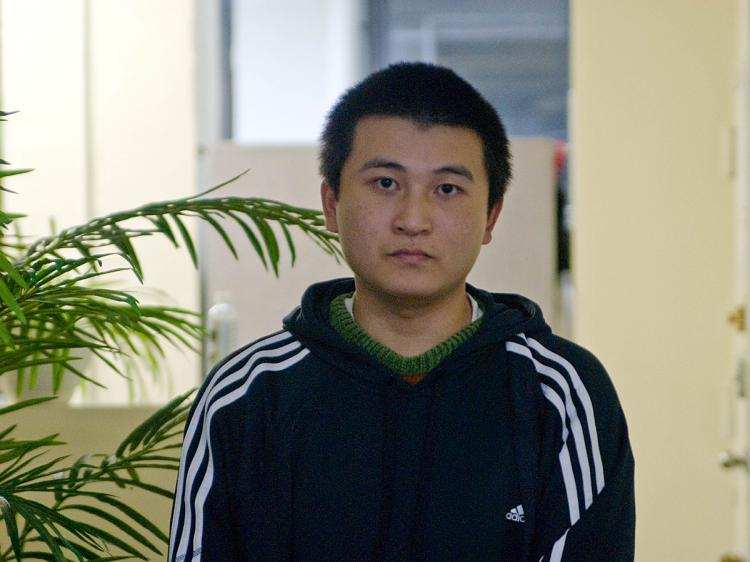Now 20 years old, Teng hasn’t seen his mother in more than six years.
He received refugee status from the United Nations and arrived in New York last month. It’s the first time he’s been able to freely speak and practice his beliefs since he was 11 years old.
Now healthy with a round face, wearing basketball shoes and a sweater, Chen told his story to The Epoch Times with the help of a translator. He recounted the years of persecution faced by his family beneath the rule of the Chinese Communist Party (CCP).
“My mother’s name was Sun Xiao Mei. She would be 47 now,” he said. “She was always very happy. People knew her for being compassionate and enjoying to help others. She was very happy to be a good person and she lived by Zhen, Shan, Ren [truthfulness, compassion, tolerance].”
Chen’s mother was a kindergarten teacher in Weifang city of China’s Shangdong Province. His father abandoned them when he was three, leaving his mother and grandmother to raise him.
When he was 7 years old, in 1995, he and his family began practicing Falun Dafa (also called Falun Gong), a Chinese meditation practice and moral discipline based on being truthful, compassionate, and tolerant. The qigong practice was widely popular in China, known for its health benefits and free lessons.
The Persecution
As the practice grew in popularity, Jiang Zemin, the former ruler of the CCP, began to see it as a threat to his power. When the full force of the persecution began on July 20, 1999, Chen’s mother was among the first to be arrested. Chen was 11 at the time.
He went to request her release to province officials with his grandma, aunt, and five-year-old cousin, yet were intercepted by the police on the way there. “They tried forcing us into a van but we wouldn’t go along with them, so they used force to beat us. Our arms and bodies were beaten black and blue,” Chen said. “I felt horrified. I’d never been through anything like that.”
His home was ransacked by police the following day. Fearing for his safety, his grandmother brought him to stay with a relative. Soon after, the police went to arrest his grandma and aunt. Chen’s uncle received a phone call on July 28 informing him that both were dead. “We were never told the cause,” Chen said.
One month later his mother was released and Chen was allowed to stay with her again. They were forced to move into a cramped apartment next to the home of a guard. “If we went out or came home, they could always see us,” Chen said.
Not long after, the police came again, this time arresting Chen along with his mother. They were held and interrogated for three months by police from the National Security Team.
Facing seemingly endless harassment for their beliefs, on October 1, 2000, Chen went with his mother and close to 100 other Falun Gong practitioners to appeal at Tiannamen Square in Beijing.
More than 30 police swarmed in. Military personnel also came, armed with rifles. Chen and his mother ducked into the crowd as the police tried to sort out the Falun Gong practitioners.
From a distance, Chen and his mother watched in horror at the events that followed.
“I felt very scared. I was crying,” said Chen. “I never saw the police beat practitioners so severely. Even their shoes were flying off—it was so brutal.”
“They also beat the children. The children were crying,” said Chen. “They then forced them into the police cars and took them away.”
Although he and his mother escaped, the police knew that they’d gone. Soon after they returned home, the police arrested his mother again. Chen was at school when it happened. “After I came back from school I tried to find my mom and waited for her to come back. I couldn’t find her,” Chen said.
He went to stay with family friends. A month after that, his mother was released. The police tried to force her to sign a paper renouncing her beliefs, yet she refused. They thus forced her into homelessness. She left alone, leaving Chen to stay with friends.
The police endlessly harassed the people he was staying with, asking for the whereabouts of his mother. Being under constant pressure, they couldn’t let Chen stay with them any longer. In February, 2001, his mother found him to be homeless with her. They arranged to meet in a secret place.
It was snowing at the time, yet the only pair of clothes Chen had was a thin school uniform.
Homeless
As the persecution against Falun Dafa went on, the CCP’s state-run media was regularly broadcasting fabricated propaganda against the practice, turning the country against the practice and those who believed in it. In light of this, Chen and his mother took it upon themselves to explain the truth to people.
A year later, in 2002, Chen’s mother was arrested and sent to a brainwashing facility, a place known in terror. He knew from others what took place there. Videos and audio play day in and day out, sometimes blaring, sometimes silent. Guards pressure one to surrender one’s beliefs, while communist propaganda invades your every sense.
“They don’t use physical torture there. They persecute your spirit,” Chen said.
His mother refused to submit and went on a hunger strike. When they finally released her she was skin and bones. “She couldn’t walk normally or she would stumble,” he said. “But she recovered quickly, doing the Falun Gong exercises. She was okay.”
Things were fine for a bit, yet in 2004 his mother was taken one last time. “I never saw her again,” Chen said, wiping tears from his eyes.
Life was difficult after that.
Chen stayed with three other Falun Dafa practitioners who were in the same situation. They parted ways after one of them, a former official, was arrested.
With no place to go, Chen returned to his old home, which was now abandoned. “When I opened the door, there were rats inside it. There were still remnants from when the police searched it,” he said.
The house was still being monitored, so to keep his whereabouts unknown he would only go there to sleep, coming in late at night and leaving early in the morning.
In a hopeless situation, Chen set his heart on escaping from China. With much difficulty he was able to get a passport, and with the help of friends was able to get a plane ticket to Thailand where he sought U.N. refugee status.
He reached his final destination in New York on March 26.
A Final Word
Chen asked to relay a final message:
In his hometown alone, 108 Falun Gong practitioners are confirmed to have been persecuted to death. “Last year before the Olympics, the police arrested over 160 practitioners,” he said.
“I hope the people all over the world will help stop the persecution of Falun Gong in China,” Chen said. “Stop the persecution.”
“Previously, the CCP persecuted Falun Gong very publicly. Now they do it very secretly. It’s still very serious, they’ve just become more cunning with it. On the surface the CCP doesn’t talk about persecuting Falun Gong very often but actually they persecute Falun Gong very seriously,” he added.






